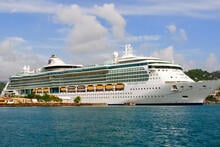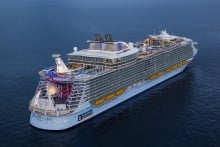There are a few ways you can book a cruise vacation, but what is the best way to book a cruise?
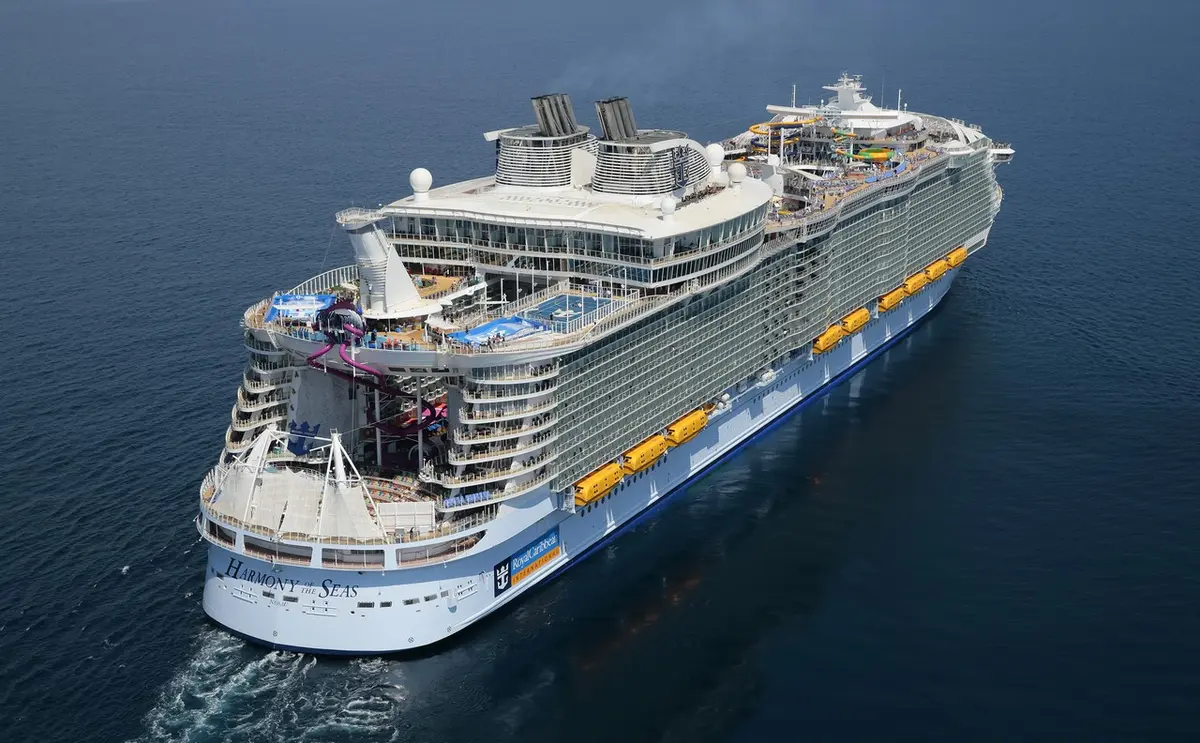
If you do a little research, you'll see cruise fare prices are more less the same when you factor in taxes, fees, and various add-ons. So why should you book one way or another?
There are advantages to booking a cruise with different outlets and agents. Unlike air travel or hotels, booking a cruise is far more complex and has not gotten as simple as those manners of travel.
This is because of all the personalization that goes into choices you make when picking a cruise. There's the cabin category, how many people in the room, gratuities, travel insurance, and it all changes if you opt for one cruise ship over another.
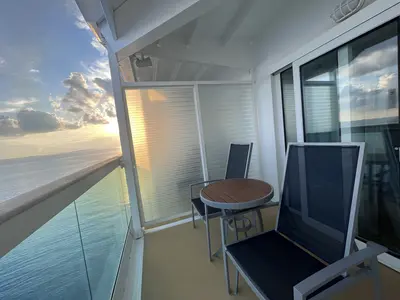
Where hotels and flights are looked at as simpler to book directly with the provider, cruise ships aren't as clear cut a choice.
So, what's the best way to book a cruise? Based on our experience through booking hundreds of cruises and feedback from our readers, here's what you should know about each way.
Direct with the cruise line (phone or web)
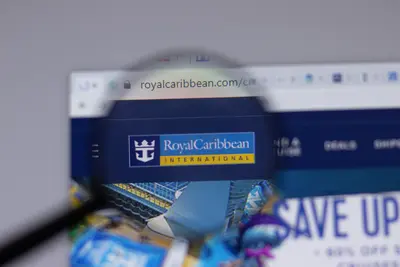
Pros: Simple approach, full control over your reservation, available 24 hours a day
Cons: No access to special rates, responsibility to manage reservation and changes on your own
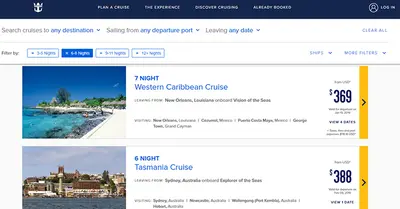
Because the public has become so conditioned to book travel directly with the airline or hotel, many first-time cruisers look to book a cruise with the cruise line directly.
You can book a cruise with Royal Caribbean by going to their website or calling their toll-free number and speaking to a representative. In either case, you'll be lead through a series of options.
This freedom in picking a direction and potentially settling on a choice is the greatest weakness with this method for someone that is brand new to cruising.
There are so many choices, as you'll have to pick a ship and sail date, and then narrow down your search to a particular category. Those three choices alone can be daunting, and you'll have to navigate hundreds of possibilities.
The cruise line website provide little to no assistance in why you should pick one ship, sailing, or itinerary over another. If you call the cruise line, depending on the representative you speak with, they could be helpful or not at all. In both scenarios, it's expected you'll know what you want to book, so the onus is on you to figure it all out.

A nice perk of booking with the cruise line directly is you can manage your own reservation. This means you can change who's booked, the sail date, or other details by simply picking up the phone and calling. Royal Caribbean's website has a few self-service options as well, but many changes to a reservation require a phone call.
Speaking of phone calls, Royal Caribbean's toll-free number can sometimes get very busy. Hold times of over an hour are not uncommon.
With a travel agency
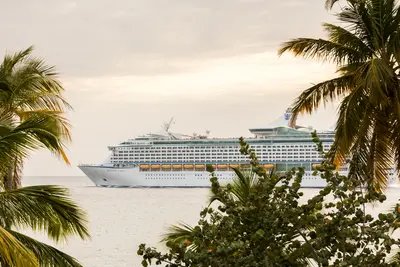
Pros: More "hand holding" for newbies, access to special group discounts and rates, middle man to deal with cruise line
Cons: Dependent on agent to make changes to core agent, not all agents are good, some agencies charge fees

It may surprise you to hear travel agents still exist and they are a very popular way to book a cruise.
Travel agents work with you to pick the cruise you want, and then do the footwork of getting it all reserved. They will guide you through the process if you're new to cruising, or take down what you want like a dinner order and then process it.
Royal Caribbean pays travel agents a commission, so there's no direct cost to you for using an agency. Some agencies elect to charge fees for their services, but that's on a case-by-case basis.
When you approach a travel agent to book a cruise, they should ask you a series of questions related to what you're interested in booking and be able to help navigate the dizzying array of choices.
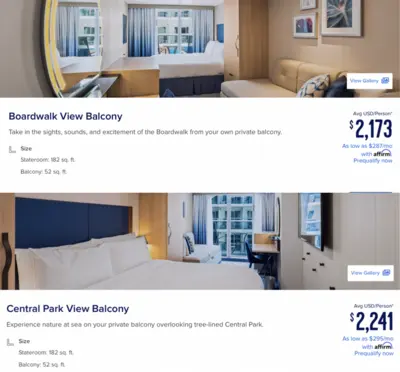
The better travel agents will have years of cruising experience themselves and be able to offer personal advice on what to consider, as well as a deep knowledge of offers available that you might not be able to find on your own, such as group space rates and travel consortiums.
They are a middle man, and the advantage is when there's something to book or change, they are the ones that do the work to wait on hold and make the change. Travel agents also have more self-service tools they can utilize for making changes.
The downside to this is when you want a timely change, like when there's a price drop or some other time-sensitive reservation to make and you have to wait for the agent to do it. Royal Caribbean will not allow someone who booked a cruise through a travel agent to make a change to their core reservation. Don't worry, the fun aspects to planning a cruise are still available for you to book (i.e. drink packages, shore excursions, spa appointments, and more).
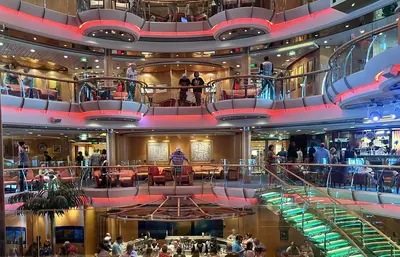
Another consideration is not all travel agents have the same experience, knowledge, or abilities. Some agents might only be working part time and/or brand new to the industry. Certainly travel agents are just as able to make a mistake as someone booking on their own directly with the line.
If you can find a knowledgeable and well-respected travel agent, they can be a valuable asset in assisting you throughout the process. This is especially true when there's a problem, such as if the cruise line changes or cancels a sailing, there is a mistake made by the cruise line, or some other unforeseen issue. The really good agents step up and act on their clients behalf to rectify the situation and make things right.
There are thousands of travel agencies, both online and local to where you live. Finding a good one is a matter of word of mouth and recommendations from trusted friends.
Through mega travel websites
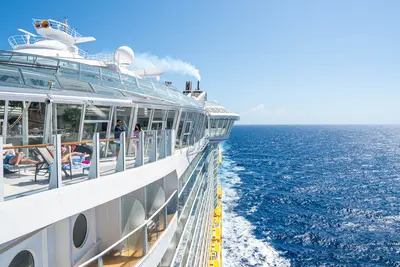
Pros: Easy to find pricing, extra incentives to book
Cons: No dedicated agent, flaky support if there's a problem

There are no shortage of travel booking sites where you can book a cruise, in addition to a hotel, car rental, or flight.
To be accurate, these sites are just like any travel agent in that they're a third party that can book a cruise. The difference is how they operate from a customer standpoint.
A nice advantage of these sites are the up-front prices you can find, especially for sailings that have low prices. It's usually easier for the cruises with the lowest prices to surface.
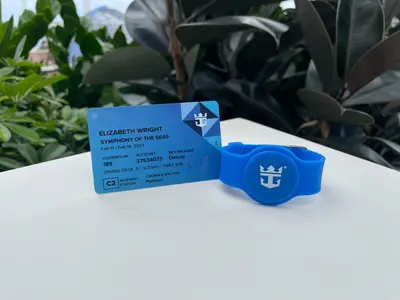
Another reason a lot of people book cruises on these big sites are the extras they offer, including bonus onboard credit, free specialty dining credits and more. These sites can do this because they use part of the commission they get from the cruise line to give back to the client in a credit.
Depending on the site, the booking process may be completely or partially online. Meaning you might have to get in contact with one of their representatives (read: travel agent) to complete the booking.
At this point, the booking and management of the reservation is just like with a travel agency and you'll be dependent on them to make changes.

Managing a reservation is arguably the worst downside to booking with a travel agent site. You probably won't have the same agent each time, so it's a matter of the round-robin call center you get. Their knowledge can be hit or miss, and during the cruise industry shutdown of 2020-2021, we heard the most reports of clients effectively abandoned by these sites because they stopped operating.
As a vacation package through an airline

Pros: Convenience of booking, possible discount on airfare or travel by bundling, extra airline miles
Cons: Third party support, fees

We see people sometimes booking their cruise as a package deal with an airline because it's an easy bundle.
Not only can you book a cruise with the same people that you need to book your flight with, but you can earn many more frequent flier miles. We've seen cruise specials offer up to 100,000 miles depending on your selected cruise.
Plus, you might be able to stack the deal with an airline credit card and you can really get a ton of points.
However, airline vacation planners might not be as knowledgeable about the ins and outs of cruises as a Las Vegas hotel. A problem with the cruise line might be better handled with a dedicated travel agent.
Through big box retailers

Pros: Lots of onboard credit, gift card reward just booking
Cons: Must be a member to book, cannot bid for stateroom upgrade

Just like how a big box retailer can save you money on bulk toilet paper or eggs, they offer incentives to book a cruise with them.
They are just like a travel agency, but the difference is the lucrative extras they can provide. Many people that book a cruise with them cite the cash cards they get back for booking, or the additional onboard credit. They rebate their cruise line commission as a way to drum up sales.
The disadvantage of big box retailers are notoriously long wait times to call in to make changes, and the strange fact you cannot bid for a stateroom upgrade.
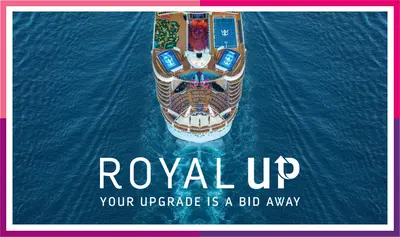
Costco mysteriously doesn't allow its customers to bid for a room upgrade with the RoyalUp program.
What to ask before you book a cruise

No matter how you choose to book a cruise, before you commit to the reservation, there are a few important questions to ask.
Fees

Be aware up front of any fees or costs for using their services, including cancelling the cruise.
Cruise lines may charge a cancellation fee depending on when you book and which fare type you book, but some agencies or websites will charge their own fee too.
Ask if there's any fee for making a change to the reservation, cancelling the cruise all together, or changing ship or sail date.
What happens if there's a price drop
You should also ask what to do if the price of your cruise goes lower than what you paid.
Royal Caribbean will allow a price adjustment if the fare drops before the final payment date to residents of select countries (i.e. United States and Canada). Nearly any place you book will require you to monitor the price for such a drop, but ask if they monitor it too.
Also ask how to submit a price drop so the agent can process it, and if there are any fees.
Bottom line
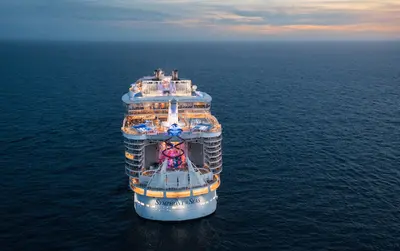
You won't pay more to book a cruise through the cruise line website or a third party, but the incentives, extras, and services you receive are what make the difference.
Depending on which option you use to book, you could end up with bonus onboard credit or extras. Any third party you select will also require them to be your gobetween or any cancellations or changes to your reservation.
There are two good reasons to book a cruise with someone other than the cruise line: access to special rates, and extra service.

While the base fares should be the same no matter where you book, group rates are a special way to get even lower rates. Group rates are hit or miss, so there's no way to really know what they are until you start looking around. And the cruise line will never offer these.
Some sites stand out for just how much you can get back in booking incentives, as well being convenient with the total vacation planning process.
When you choose where to book your cruise, you want to balance the service you get with the incentives they offer. You could get a ton of onboard credit at the expense of slow service when you need changes.
We recommend working with a good travel agency that has been recommended by a trusted source for providing good service and helpful advice. Whether you are a new cruiser or experienced, having someone who knows their stuff and can work on your behalf to troubleshoot any problems you encounter is worth any amount of onboard credit.
Planning a cruise? Start here:
- 8 cruise tips for first-time Royal Caribbean cruisers
- What’s included in your Royal Caribbean cruise fare
- 5 quick and easy tips for finding a great shore excursion on your own
- Food on a Royal Caribbean cruise
- Which is the best Royal Caribbean cruise ship?
- What is the best time to go on a Caribbean cruise?




